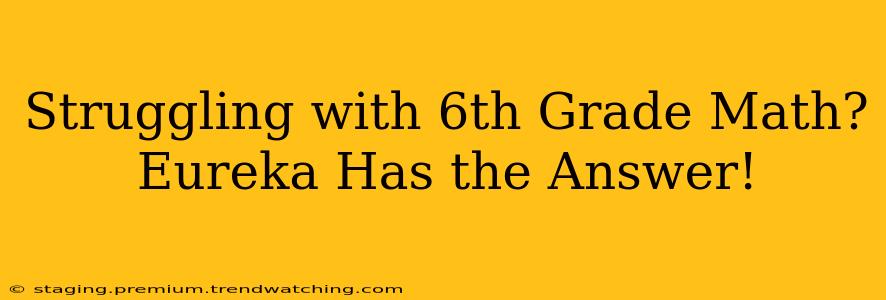Sixth grade math can be a challenging leap for many students. The introduction of more complex concepts like ratios, proportions, and pre-algebra can leave kids feeling overwhelmed and frustrated. But don't worry! With the right approach and resources, mastering 6th-grade math is entirely achievable. This guide will explore common struggles, provide effective strategies, and highlight why Eureka Math might be the solution your child needs.
What Makes 6th Grade Math So Difficult?
The jump from elementary school math to 6th grade often presents several hurdles:
- Increased Abstraction: Sixth-grade math moves beyond concrete numbers and introduces more abstract concepts requiring a deeper understanding of mathematical relationships.
- New Concepts: Topics like integers, algebraic expressions, and geometric shapes are entirely new for many students, demanding significant time and effort to grasp.
- Problem-Solving Complexity: Word problems become increasingly complex, requiring students to analyze information, identify relevant data, and apply multiple steps to arrive at a solution.
- Transition to Pre-Algebra: 6th grade lays the groundwork for future algebra courses, meaning a strong foundation is crucial for future success in mathematics.
Common 6th Grade Math Struggles: A Parent's Guide
Parents often see their children struggling with specific 6th-grade math concepts. Let's address some of the most frequent concerns:
What are the most difficult concepts in 6th-grade math?
Many students find fractions, decimals, and their relationship to percentages particularly challenging. Understanding ratio and proportion, as well as the transition into pre-algebraic thinking (solving equations and inequalities), are also common stumbling blocks. Geometric concepts, including volume and surface area calculations, can also present difficulties.
How can I help my child improve their math grades?
Consistent practice is key. Encourage regular homework completion, and dedicate time for extra practice using online resources or workbooks. Break down complex problems into smaller, manageable steps. Focus on understanding the underlying concepts rather than just memorizing formulas. Create a supportive learning environment free from pressure and celebrate small successes. Consider seeking extra help from a tutor or teacher if needed.
What are some effective learning strategies for 6th-grade math?
Effective strategies include visual aids like diagrams and manipulatives, real-world application of concepts, collaborative learning with peers, and the use of technology such as educational apps and online games. Regular review of previously learned material is crucial for reinforcing understanding and preventing knowledge gaps from forming.
Are there any online resources that can help my child with 6th-grade math?
Many online resources cater specifically to 6th-grade math, offering interactive lessons, practice exercises, and tutorials. Khan Academy, IXL, and other educational websites provide valuable support. Always check the credibility and alignment with your child's curriculum before utilizing any online resource.
My child is falling behind in math. What should I do?
Early intervention is critical. Communicate with your child's teacher to understand the areas where they're struggling. Explore additional support options, such as tutoring, after-school programs, or online resources. Work together with your child to develop a plan for catching up, focusing on building confidence and understanding. Don't hesitate to seek professional help if the challenges persist.
Why Eureka Math Might Be the Answer
Eureka Math (EngageNY) is a widely used curriculum known for its rigorous approach and emphasis on conceptual understanding. Here's why it could be beneficial for your 6th grader:
- Focus on Conceptual Understanding: Eureka Math prioritizes understanding the "why" behind mathematical concepts rather than simply memorizing procedures. This approach builds a stronger foundation for future learning.
- Structured Lessons: The curriculum's modular structure provides a clear progression of learning, ensuring students build upon previously learned concepts.
- Collaborative Learning: Eureka Math often incorporates group work and discussions, fostering collaboration and peer learning.
- Real-World Applications: The curriculum integrates real-world examples and applications to make math more relatable and engaging.
While Eureka Math is a highly regarded program, remember that every child learns differently. The best approach involves identifying your child’s specific learning style and adapting strategies to fit their needs. Open communication with your child's teacher remains crucial for ensuring their success in 6th-grade math.

